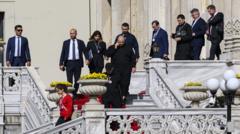During recent peace talks in Istanbul, Russia and Ukraine could not come to an agreement on a ceasefire, although they did confirm plans for a prisoner exchange involving thousands of soldiers. Ukrainian officials decried Russia's reluctance to engage in a "full and unconditional ceasefire," reflecting ongoing hostilities since the conflict began in 2022.
Russia and Ukraine's Peace Talks End Without Ceasefire Agreement But Prisoner Swap Confirmed

Russia and Ukraine's Peace Talks End Without Ceasefire Agreement But Prisoner Swap Confirmed
The latest negotiations between Russia and Ukraine in Istanbul yielded no ceasefire agreement, yet both sides have committed to a significant prisoner exchange, amid ongoing tensions in the region.
A round of peace talks held in Istanbul between Russia and Ukraine concluded without achieving a ceasefire, a critical demand from Ukraine and its allies. The discussions, which lasted just over an hour, focused primarily on the ongoing conflict that has endured since Russia's full-scale invasion of Ukraine in February 2022. While no breakthrough was made in regards to a ceasefire, both nations agreed to proceed with a significant prisoner swap involving sick and severely wounded fighters, along with those under the age of 25.
Ukrainian officials voiced their disappointment, stating that Moscow had declined to accept a proposal for an "unconditional ceasefire," thereby prolonging the violence. The Russian side proposed a temporary ceasefire of two to three days in specific areas but did not provide further clarification. Ukrainian Defense Minister Rustem Umerov stressed that Ukraine's request was for a full ceasefire lasting at least 30 days to halt the bloodshed on all fronts, including land, air, and sea.
During the talks, Ukrainian President Volodymyr Zelensky expressed frustration with Russia’s approach, particularly towards its proposition of a short ceasefire aimed at collecting deceased soldiers. Speaking candidly on social media, he remarked that a ceasefire should prioritize halting loss of life. Public disclosures of the ceasefire proposals have yet to surface, although Russian state media hinted at demands for Ukraine's military withdrawal from specific territories and recognition of disputed areas.
Deputy Foreign Minister Serhiy Kyslytsia reiterated that Russia had rejected the idea of a ceasefire, while Ukraine highlighted ongoing issues, including the forced deportation of children to Russia. As both sides await further responses and potential proposals, anticipation builds for more direct dialogue between Zelensky and Russia's President Vladimir Putin.
In a notable commitment, the delegations confirmed the exchange of 6,000 bodies of soldiers from each side, although timelines for these exchanges remain unspecified. While stronger sanctions on Russia are being discussed in the international arena, skepticism remains regarding the advancement of substantial negotiations, particularly given the perceived lack of genuine interest from the Russian side.
In light of these developments, Zelensky emphasized the importance of bolstering Ukraine’s defense capabilities and increasing pressure on Russia through sanctions. As the conflict continues without a resolution, the prospect of meaningful dialogue remains uncertain, leaving the path to peace clouded with challenges.





















